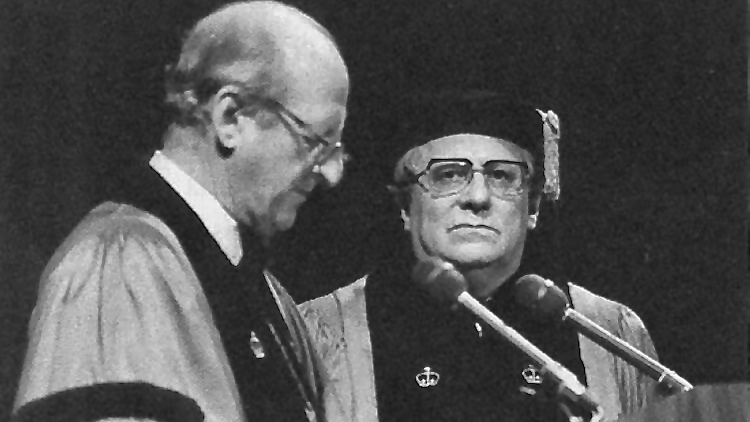Remembering Emilio Filippi’s Cabot Prize for excellence in Latin American journalism
At a time in which freedom of press was nonexistent in Chile, Columbia’s Journalism School honored a courageous reporter in 1983.

Forty years ago, Chilean journalist Emilio Filippi was honored at Columbia University with the María Moors Cabot Prize for excellence in Latin American journalism.
Founded in 1938, the Cabot Prizes are the oldest international awards in the field of journalism. They acknowledge both journalists as well as news organizations for their exceptional and courageous reporting that impacts society. In 1983, Chilean journalist Emilio Filippi (1928-2014) had decades of experience as a fearless reporter of Chilean current events.
A native of Valparaíso, Chile, and the son of Italian immigrants, Emilio Filippi began his career as a journalist while still in high school. An innate journalist, during the 1940s he directed his school’s paper and worked in La Voz de la Comuna, a newspaper published in the municipality of Villa Alemana.
As a reporter for the daily newspaper La Unión, he was named ‘best journalist of the year’ twice, in 1951 and 1953, by the Círculo de la Prensa de Valparaíso. He moved to Concepción in 1956 to work as editor of the evening newspaper Crónica. His success in revitalizing Crónica—circulation increased 300 percent—led to his appointment as editor of his publisher’s largest newspaper, El Sur, in 1959. When two major earthquakes devastated Concepcion in 1960, El Sur never stopped publication, despite ravaged oflices and decimated work force. The paper received the Inter American Press Association’s Mergenthaler Award for distinguished service for its efforts during that traumatic time.
In 1965 Filippi left El Sur to become Latin American director of the Inter Press Service and a year later joined Empresa Editorial Zig Zag, a large Chilean publishing company, as director of its journalism activities. In 1968 he became editor of Chile’s oldest news magazine, Ercilla, and in just four years reversed the magazine’s declining fortunes, making it one of the most successful and popular in the country. In 1972 he was honored with the highest distinction granted to a Chilean journalist, the Premio Nacional de Periodismo (National Journalism Award).
During the years of the Unidad Popular government of President Salvador Allende (1970-1973), Ercilla prided itself on its editorial objectivity. When the Pinochet dictatorship came to power after the military coup of 1973, the magazine was subjected to constant censorship from the military regime; once an entire issue was banned. Making no attempt to conceal editorially the censor’s hand, Filippi allowed white gaps to fill the magazine’s pages where paragraphs and even whole articles had been removed.
When he was forced to resign, all of Ercilla’s editors resigned in protest. Together with Filippi, they formed a new magazine, Hoy, which first appeared in June 1977. The success of this magazine despite government efforts to stifle its publication has been astonishing. Today Hoy is Chile’s largest circulation news magazine. For its efforts in defense of press freedom, and its publication of the book Libertad de Pensar, Libertad de Decir (Freedom of Thought, Freedom of Speech), Hoy received the Inter American Press Association’s Pedro Joaquin Chamorro award. Gaining even further recognition, Filippi was named newsmagazine editor of the year in 1982 by the Metropolitan Council of the Journalists Association of Chile.
*This article is based on a 1983 publication of the Columbia Record newspaper which can be accessed here.